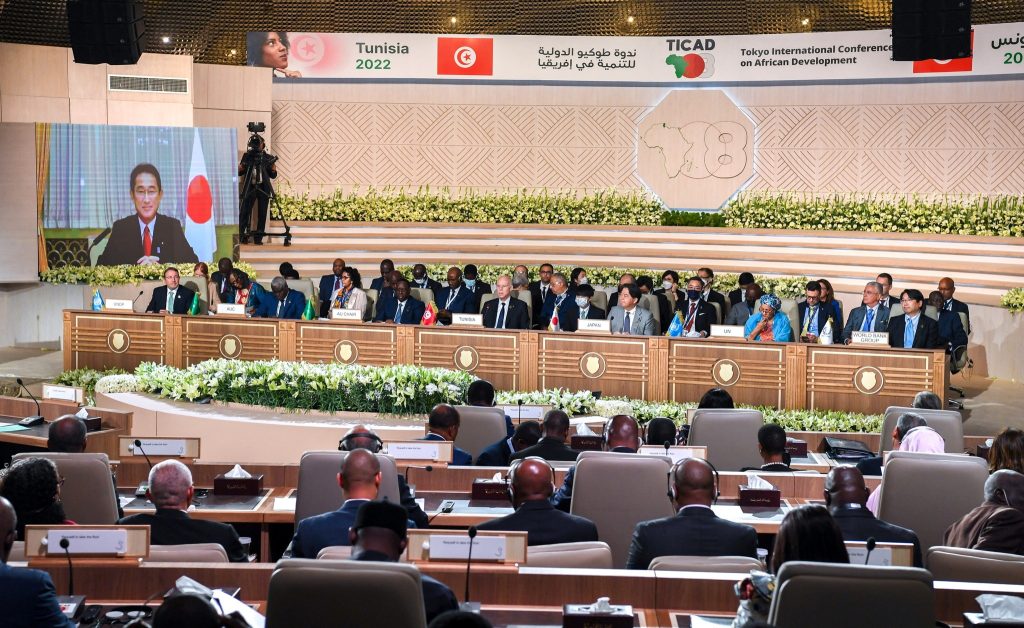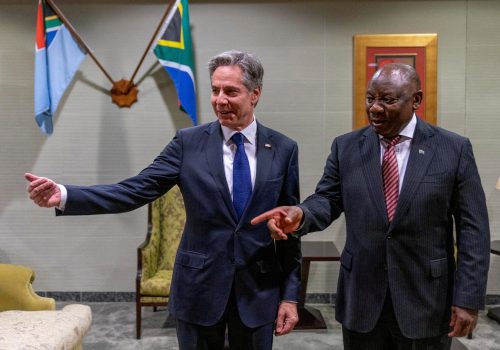At a time when China, the United States, and Russia are competing in Africa in ways reminiscent of Cold War rivalries on the continent, Japan, whose eighth Tokyo International Conference on African Development (TICAD) has just ended in Tunis, is entering the arena too. Some see Japan and other major Asian countries as potential alternatives to China for Africa to explore as partners. By launching the TICAD in 1993, Japan was the second country, after France, to set up a formal mechanism for cooperation with all of Africa. While Japan is mourning the loss of former Prime Minister Shinzo Abe, who helped build a new Japanese legacy in Africa, Prime Minister Fumio Kishida has his work cut out for him as he approaches the one-year mark.
Under Abe’s leadership, Japan’s cooperation shifted from assistance to business investment in the private sector. Kishida aims to supercharge both with a three-year, thirty-billion-dollar, public-private commitment announced at TICAD8.
The outcomes of TICAD8 in Tunis, where some twenty African heads of state and government were among the five thousand participants, reflect the clear aim of Japan to differentiate itself from China. A number of side events on subjects ranging from deforestation and digital transformation to agriculture and more leveraged Japan’s strengths. The ministerial and summit meetings focused on key countries across West and East Africa and the Sahel.
Japan’s investment levels might fall far short of China’s and its “Belt and Road” infrastructure initiative, but Japan clearly wants to position itself as a key partner. In a closing speech at TICAD8, Kishida called for a permanent African seat on the United Nations Security Council and announced that his country will push in that direction when it becomes a non-permanent member in 2023-24.
Where Japan makes the difference is the role of its private sector in Japan-Africa cooperation. Japanese companies have a presence in all fifty-four countries, with firms like Toyota Tsusho, Rakuten, Sony, Nippon Steel, and Ajinomoto leading the way. The number of Japanese companies on the African continent increased from 169 in 2013 to 259 in 2019. It is in the field of innovation that these companies bring the most significant advantage compared to China, which is more focused on infrastructure. To crown this policy, the Japan International Cooperation Agency created the Next Innovation with Japan (NINJA) program to further harness entrepreneurship, innovation, and business creation. Africa can draw lessons from Japan’s experience with having the world’s longest-running businesses with 33,000 companies over a century old to complement the rise of start-ups in Africa that need support with sustaining and scaling their businesses.
Japanese strengths
Japan is right to elevate its ambitions in Africa. It is a global power and can restore influence by leveraging its tremendous strengths in Africa. Their relationship isn’t new: Yasuke, an African man born in Mozambique, arrived as a slave in Japan toward the beginning of the sixteenth century before becoming the country’s first foreign Samurai. The internationalization of Japan has historically been slow due to the history of the archipelago during the isolation period between the seventeenth and nineteenth centuries. There are just twelve thousand Africans in Japan today, compared to some eleven million in Europe, five million in the Middle East, more than three million in North America, and an estimated five hundred thousand in China. Still, Japan is starting to open up: Foreign residents hit a new record of 2.56 million in 2017.
Travel freedom strengthens this renewed openness. According to the Henley Passport Index, Japanese citizens can travel to more destinations without needing a visa than their peers from any other country. While Seychelles has the most powerful passport in Africa, improving access for other African nations to travel freely to Japan will spark innovation, build trust, and enable a diverse group of foreigners to participate in domestic business opportunities.
In sports too, Japan is showing a newfound commitment to diversity—through the Tokyo Summer 2020 Olympic Games concept of “Unity in Diversity,” which was later modified to “United by Emotion,” and standout athletes like Japanese-Beninese basketball player Rui Hachimura and Japanese-Haitian tennis star Naomi Osaka. When Japan hosted the Rugby World Cup in 2019, it reached the top eight with more than half of its roster made up of foreign-born players. “Without such diversity, I don’t think they could have accomplished what they did,” Shinichi Inoue, president and CEO of All Nippon Airways, said this year.
Japan also has unique advantages in Africa. It is neither a former colonial empire nor a global power with hegemonic views. This provides Japan freedom to explore different areas of cooperation and build an innovative relationship with new generations. The third-largest economy in the world, Japan can leverage its hard power in transport production, electronics equipment manufacturing, and steel for infrastructure development, as well as its soft power in traditional arts, culinary science, sports, creative industries, space, gaming, sciences, and technology. On a continent that has a critical need for creating jobs and transforming its economy, Japan can be a game-changer.
Japan and Africa also complement each other in ways that can help the East Asian nation deliver on its domestic objectives. Japan’s efforts toward the modernization of its economy and a low-carbon transition face challenges: the highest national debt in the world at 234 percent of its GDP, and the highest proportion of the total population over the age of 65. Japan’s dwindling working-age labor force caters to its aging population, which impedes economic growth. In July, companies offered 129 job openings for every 100 job seekers in Japan, according to government data. Africa, on the other hand, has the fastest-growing youth population and many of the fastest-growing economies in the world. Africans could help fill those vacant jobs and power the Japanese economy.
People-to-people ties
Africa’s demography can be an asset in the Japan-Africa relationship, especially as education and training levels rise on the continent and poverty falls. By opening its borders to more Africans, Japan could usefully develop new people-to-people ties and in the meantime find renewed answers to its challenges of aging and low productivity.
Africans, who grow up speaking four languages on average on a continent with thousands of dialects, are increasingly exposed to Mandarin in their classrooms as China expands its influence. In comparison, just thirteen thousand Africans were learning Japanese as of 2018. With more knowledge and understanding could come a cultural awakening.
Leveraging technology transfer
Japan ranks third in the world in information and communication technology with a 6.4 percent market share, placing big bets on 5G, cloud and quantum computing, and edge computing. However, technology alone will not solve the social determinants that are inhibiting inclusive growth. Back in 2016, the Council for Science, Technology, and Innovation came up with the concept of Society 5.0, which is defined as “a human-centered society that balances economic advancement with the resolution of social problems by a system that highly integrates cyberspace and physical space.” It’s the Japanese version of the metaverse but really aims to solve social problems.
To unlock this idea, a whole-of-government approach is vital. For the TICAD8 follow-up, African leaders should examine how their youth populations can contribute to this large vision and what digital infrastructure investments are required to realize it both in Japan and Africa.
Balancing climate and development
Earlier this month the US Congress passed the Inflation Reduction Act, which includes nearly $400 billion of investments intended to fight climate change. As the second-largest polluter in the world, behind China, the United States is taking a big step toward meeting the $4.5 trillion to $5 trillion of climate investment required every year to keep the globe from warming more than 1.5 degrees Celsius. Japan should heed the Africa Economic Outlook 2022 report to meet the energy goals of Africa.
Furthermore, United Nations Sustainable Development Goal (SDG) seven—addressing affordable and clean energy initiatives—is an area where Japan seems to have begun reducing its strategic influence. Financing schemes are required to accomplish the SDGs in Africa, with the continent only halfway to achieving the targets by 2030. This is all the more important as Japan had prioritized this question at the 2019 TICAD7 and more specifically in the Yokohama Plan of Actions Monitor, an online platform that allows partners to report progress on key performance indicators.
These objectives are well in alignment with the African Union’s program infrastructure development plan, the global Group of Seven (G7) nations Partnership for Global Infrastructure Initiative, and the 2+2 Dialogue between India and the United States. Though they were disrupted due to the global pandemic and now the war in Ukraine, these initiatives present opportunities for Japan to partner with its global allies and build a collective approach to developing the continent.
The competitive context in the Indo-Pacific offers a historic opportunity for such cooperation between the West (specifically the United States and France) and major Asian powers (Japan and India). That is the most recent testament to the allure of the African continent.
Rama Yade is the senior director of the Atlantic Council’s Africa Center and a senior fellow at the Europe Center. She is a professor at Sciences Po Paris and Mohammed 6 Polytechnic University in Morocco. She was a member of the French cabinet, serving as deputy minister for foreign affairs and human rights and ambassador to UNESCO.
Tyrell Junius is associate director of the Atlantic Council’s Africa Center. He served as a US Peace Corps volunteer in Zambia and earned his master’s in business administration from the Graduate School of Management at Globis University in Tokyo.
Further reading
Mon, Nov 29, 2021
Africa’s digital infrastructure is the next playing field for great-power competition
AfricaSource By Aubrey Hruby
US-China competition will be shaped by efforts to support Africa's digital infrastructure.
Tue, Aug 30, 2022
Inaction to reform the international development system is not an option anymore
AfricaSource By Rama Yade
Africans are looking at the United States’ focus on the war in Ukraine and on tensions in the Indo-Pacific, and they’re wondering: Will the United States truly consider African countries as strategic partners as China and Russia claim to do?
Mon, Jun 20, 2022
Time to get ‘glocal’: Here’s how the US can better connect the African and African diaspora communities
AfricaSource By Tyrell Junius
In this new vision, the United States should implement policies at the local level that fold into an international agenda.
Image: Japanese Prime Minister Fumio Kishida speaks via video link at the Tokyo International Conference on African Development (TICAD) in Tunis, Tunisia August 27, 2022. (Tunisian Presidency/Handout via REUTERS)



